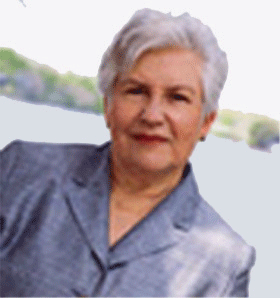Gloria F. Donnelly, Ph.D., RN, FAAN, FCPP
Dean and Professor, College of Nursing and Health Profession
Drexel University
Editor in Chief, Holistic Nursing Practice
Background:

Gloria F. Donnelly, PhD, RN, FAAN
Gloria Ferraro Donnelly, a leader in nursing education, both regionally and nationally, is Dean of the College of Nursing and Health Professions at Drexel University. Before coming to Drexel University, she served as founding Dean of the School of Nursing, La Salle University, Philadelphia, PA. A native Philadelphian, Dr. Donnelly earned her Bachelor of Science in Nursing from Villanova University, Villanova, PA. She holds a Master of Science in Nursing from the University of Pennsylvania, School of Nursing with specializations in psychiatric nursing and nursing education. In 1985 she was awarded a federal National Service Research Pre-Doctoral Fellowship to attend Bryn Mawr College where she received the Ph.D. in Human Development in 1985.
Dr. Donnelly is the author of four textbooks, the winner of two American Journal of Nursing Book of the Year awards. She is currently the editor of Holistic Nursing Practice, a refereed journal published by Lippincott, Williams and Wilkins and has published 100 articles and chapters. Further, she continues to teach and design courses particularly online.
Dr. Donnelly serves on many corporate boards including the Board of Hahnemann University Hospital, the Advisory Board of the Nurses Services Organization, a professional liability company and the Philadelphia Convention and Visitors Bureau. For nine years, Dr. Donnelly served as Chairman of the Board of Directors for Horizon House Inc., an organization that serves residents of the Delaware Valley who are experiencing mental illness and mental retardation. She has been honored as a March of Dimes, Woman of Achievement and as a Philadelphia Business Journal Woman of Distinction.
For the past 26 years, Dr. Donnelly and her husband Joseph, have lived with and cared for three elderly parents, Dr. Donnelly’s mother and father and Joe’s mother. Her insights on the rewards and stresses of family caregiving are intended to create perspective and successful strategies for those family members, who willingly or reluctantly, are now family caregivers.
March of Dimes, Woman of Achievement and as a Philadelphia business Journal Woman of Distinction.
For the past 26 years, Dr. Donnelly and her husband, Joseph, have lived with and cared for three elderly parents, Dr. Donnelly’s mother and father and Joe’s mother. Her insights on the rewards and stresses of family care giving are intended to create perspective and successful strategies for those family members, who willingly or reluctantly, are now family caregivers.
Overview:
This show will address the following issues; Understanding the individuality of dementia; how dementia exacerbates the positive and negative aspects of relationships and how caregivers can manage their emotions and reactions to unfiltered interactions with their loved one; Insights from 26 years of experience as a family caregiver, caring for 3 elderly parents living with me and my husband.
- The discussion will highlight how the character of past relationships between caregiver and loved one influences interactions when dementia is progressing. Description of 3 different relationships between caregivers and loved ones will be described – cross gender relationships; parental relationships; in-law relationships and friendships.
- Examples of unfiltered interactions (bedtime revelation of ethnic bias; racial bias toward a caregiver; the search for a new wife; and détente at the dinner table) and caregiver reactions will be offered to highlight the self-management of the caregiver’s reactions, emotions. The importance of understanding the nature of dementia progression and using self-talk and humor to move through difficult interactions will be emphasized.
- The upside of reminiscence for the caregiver and its downside for the loved one when memory is fading is an important factor in caregiver relationships.
- Dementia can be in the eye of the beholder – “there is nothing wrong with your mother, we had a wonderful conversation today.” The belief and the reality.
3 Key Points:
- Family caregivers need to reflect on the history of their relationship with loved ones for whom they are caring. This history can influence the care giving relationship positively or negatively depending on how the dementia progresses.
- Caregivers need to forgive themselves for frustrating or negative reactions with those under their care. Both positive and negative emotions are a part of family life whether dementia is part of the equation or not. Self talk and humor are important self-management strategies.
- An AARP study of family caregivers revealed that prayer is the most frequently reported coping mechanism. Prayer calms the mind and promotes hope.

 Valentine Group Health
Valentine Group Health


